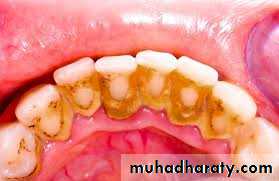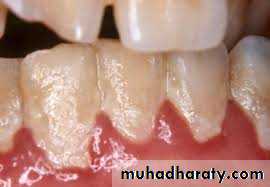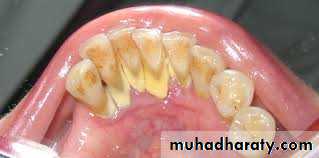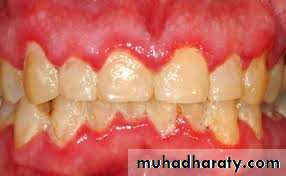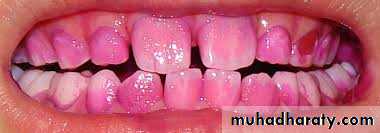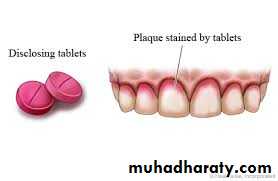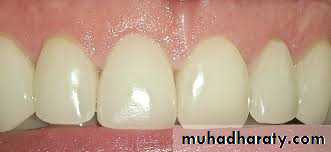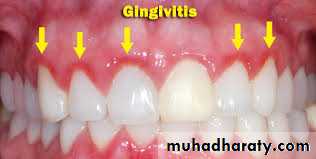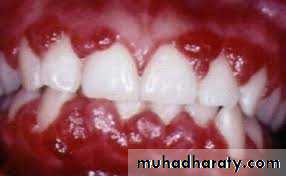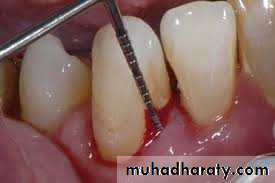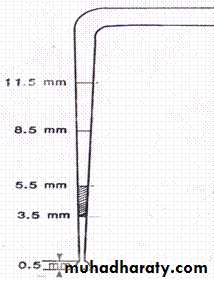Community dentistry
• Indices used for periodontal disease assessmentPeriodontal diseases and their etiological factors:
Gingivitis: It is an inflammation of gingival tissue mainly caused by dental plaque. Periodontitis: It is an inflammation of periodontal ligament which mainly precede by un treated gingivitis.
Dental plaque: It is soft non mineralized, bacterial deposit formed on the tooth surface.
Calculus: It is a hard deposit that forms by mineralization of dental plaque.
• Indices used for periodontal disease assessment
Gingivitis refers to inflammation of the gums due to an excess of plaque on the teeth. Signs of gingivitis include red, swollen gums, or gums that bleed easily when you brush your teeth. By contrast, periodontitis has progressed to more serious gum disease. One key sign of periodontitis: the gum tissue pulls away from the teeth, creating pockets where additional bacteria can build up and cause an infection. Many people do not notice symptoms of gingivitis, but signs of possible periodontitis include red, swollen, or bleeding gums, pain when chewing, poor tooth alignment, receding gums or pockets between the teeth and gums, sores on the inside of the mouth, and loose or sensitive teeth.
Gingivitis vs Periodontitis
• Indices used for periodontal disease assessment
• Indices used for periodontal disease assessment
Indices used for plaque and debris assessment:
*Plaque Index (PlI) …Introduced by Silness and Loe in 1964
• Indices used for periodontal disease assessment1-Used on all teeth (28, so wisdom teeth are excluded) or selected teeth (6) .
2-No substitution for any missing tooth.3-Used on all surfaces (4)(M, O, D, L) or selected surfaces (M, O, L).
• Indices used for periodontal disease assessment
Indices used for plaque and debris assessment:
*Plaque Index (PlI) …
• Indices used for periodontal disease assessment
4-This index measures the thickness of plaque on the gingival one third.Indices used for plaque and debris assessment:
*Plaque Index (PlI) …• Indices used for periodontal disease assessment
6 2 4 E B D4 2 6 D B E
Indices used for plaque and debris assessment:
*Plaque Index (PlI) …
• Indices used for periodontal disease assessment
Score Criteria0 No plaque
A film of plaque adhering to the free gingival margin and adjacent area of the tooth, which can not be seen with the naked eye. But only by using disclosing solution or by using probe.
1
• Indices used for periodontal disease assessment
Score CriteriaModerate accumulation of deposits within the gingival pocket, on the gingival margin and/ or adjacent tooth surface, which can be seen with the naked eye.
2
• Indices used for periodontal disease assessment
Score Criteria3
Abundance of soft matter within the gingival pocket and/or on the tooth and gingival margin.
• Indices used for periodontal disease assessment
Calculus Surface Index (CSI)
introduced by Ennever et al in 1961Indices used for calculus assessment:
1- CSI assesses the presence or absence of supra and/or subgingival calculus by visual or tactile examination, regardless the quantity of calculus.
Indices used for calculus assessment:
Indices used for calculus assessment:2- Criteria 0 – Absence
1 – Present3- 4 or 6 mandibular anterior teeth are examined.
4- Each tooth divided into 4 areas.
Indices used for gingival disease assessment:
Gingival Index (GI).... which was introduced by Loe and Silness in 1963
1- GI could be used in all teeth or selected teeth and in all surfaces or selected surfaces.
2- The examination done by blunt probe.
3- Partially erupted teeth, retained roots, teeth with periapical lesion and third molars should be excluded and there is no substitution.
Indices used for gingival disease assessment:
No inflammation.Mild inflammation, slight change in color, slight edema, no bleeding on probing.
Moderate inflammation, moderate glazing, redness, bleeding on probing.
Severe inflammation, marked redness and hypertrophy, ulceration, tendency to spontaneous bleeding
Score Criteria
0
1
2
3
0.1 - 1 Mild gingivitis
1.1 - 2 Moderate gingivitis
2.1 - 3 Severe gingivitisIndices used for gingival disease assessment:
Gingival Index (GI)....
Indices used for gingival disease assessment:
Indices used for gingival disease assessment:
Periodontal Disease Index (PDI):
Introduced by Ramfjord in 1959
Composed of three components:
1- Gingival and periodontal component
2- Plaque component
3- Calculus component
Indices used for periodontal disease assessment
All the three components will be scored separately using six Ramfjord selected teeth.
61 4
4 1
E
A D
D A
Periodontal Disease Index (PDI):
Indices used for periodontal disease assessment1-Gingival and periodontal component:
1-The criteria ranged from:
0 1 2 3 4 5 6normal gingivitis periodontitis
Periodontal Disease Index (PDI):
Indices used for periodontal disease assessment
Periodontal Disease Index (PDI):
Indices used for periodontal disease assessment1-Gingival and periodontal component:
2-All areas (M, D, B, L) is scored as a one unit.
3-Only fully erupted teeth are scored .4-There is no substitution for excluded teeth.
2-Plaque component:Periodontal Disease Index (PDI):
Indices used for periodontal disease assessment
Scoring criteria:
0 No plaque
1 Plaque present on some but not on all interproximal, buccal, and lingual surfaces of the tooth.
2 Plaque present on all interproximal, buccal, and lingual surfaces, but covering less than one half of these surfaces..
3 Plaque extending over all interproximal, buccal and lingual surfaces, and covering more than one half of these surfaces.
2-Plaque component:
Periodontal Disease Index (PDI):
Indices used for periodontal disease assessment
2-All areas ( B , L , M , D ) are scored as one unit.
3-Only fully erupted teeth are scored .
4-There is no substitution for excluded teeth.3- Calculus component:
Periodontal Disease Index (PDI):Indices used for periodontal disease assessment
Scoring criteria:
0 Absence of calculus.
1 Supragingival calculus extending only slightly below the free gingival margin (not more than 1 mm).
2 Moderate amount of supragingival and sub gingival calculus or sub gingival calculus alone.
3 An abundance of supra gingival and sub gingival calculus.
Community Periodontal Index of Treatment Needs (CPITN)
introduced by WHO / FDI in 19821-The mouth is divided into six parts.
2- The examination done by special probe (WHO probe).
3- The score is identified by examination of specified index teeth or all teeth.
Community Periodontal Index of Treatment Needs (CPITN)6
6
6
6
1 Right
1 Left
Community Periodontal Index of Treatment Needs (CPITN)
Community Periodontal Index of Treatment Needs (CPITN)
score criteria0 No periodontal disease.
1 Bleeding on probing.
2 Calculus with plaque seen or felt by probing.
3 Pathological pocket 4 – 5 mm.
4 Pathological pocket 6 mm or more.
x When only 1 tooth or no tooth are present.
Community Periodontal Index of Treatment Needs (CPITN)
Treatment Need
score criteria
0 No need for treatment.1 Personal plaque control (OHI).(1- 4).
2 Professional plaque control (scaling and polishing). (2- 4).
3 Deep scaling , root planning, surgical procedure. (3- 4).

